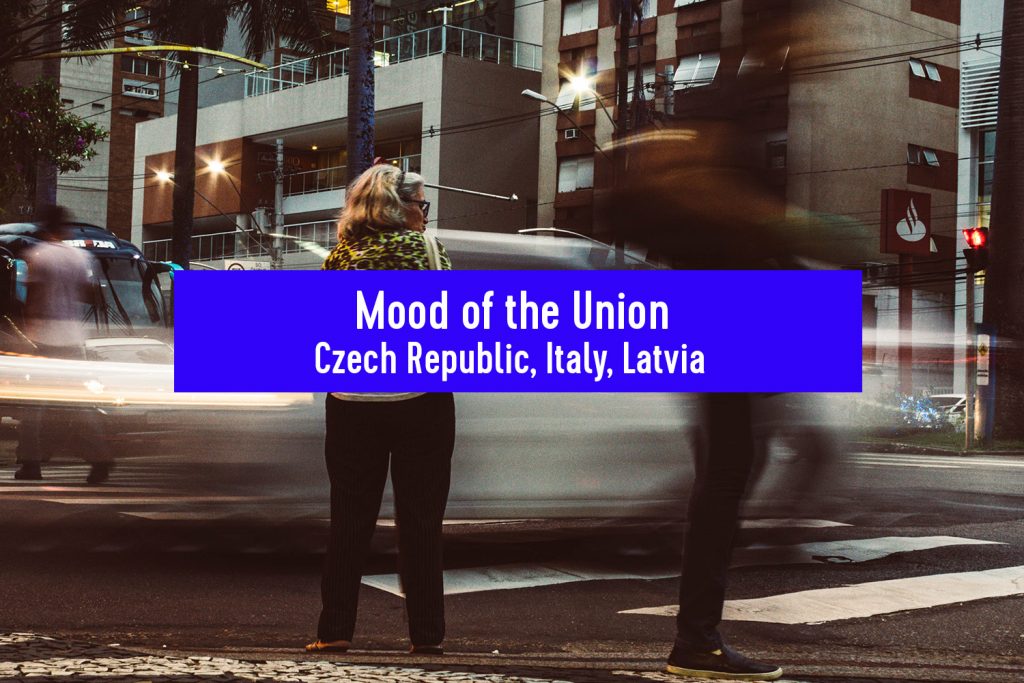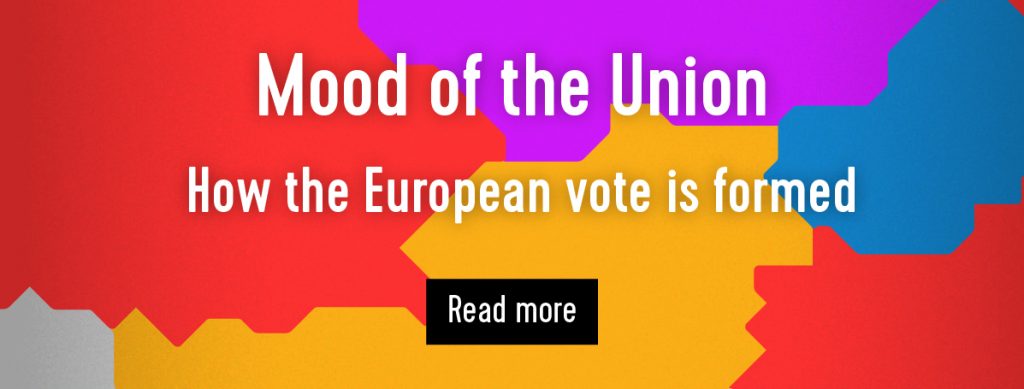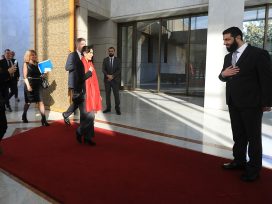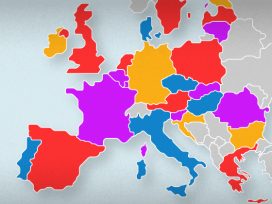Though a general aversion to Europe has recently become subtly less pronounced in Italy’s current government, the EP elections this May will still be the first in which the country has an overtly eurosceptic government. This is in stark contrast to Latvia, where no mainstream party running for election is taking a europsceptic line, as to do so may be seen to threaten Latvia’s place in the West and thus its security.
Finally, the Czech Republic sent a representative of the nationalist Party of Free Citizens (renamed simply ‘Free’ since 2019) to the European Parliament in 2014, despite the party having no representation whatsoever in the Czech parliament at the time. This illustrates the danger posed by traditionally low turnouts in the EP elections, a factor that has never been more relevant than now.

Photo by Maurício Mascaro from Pexels
Italy: A European flag in every window?
Nicola Pedrazzi, Editor, Il Mulino, Bologna
In the run-up to the European elections, former president of the European Commission Romano Prodi asked his fellow citizens to hang a European flag in their windows. Why? For the first time in its history, Italy is going into the EP elections with an openly eurosceptic government. In recent years, both the Five Star Movement (which achieved 33 percent of the vote in the 2018 general election) and LEGA (17 percent) have increased their support thanks to a political discourse that emphasises the need for Italian sovereignty in economic questions while objecting to the country’s isolation in the so-called ‘migration crisis’.
This general aversion to Europe – less explicit since the parties have been in power – seems to be the ideological glue of a government that struggles to maintain its unity on a daily basis. Charismatic Deputy Prime Minister Matteo Salvini has ruthlessly used social networks to turn LEGA from a secessionist party rooted in northern Italy into a nationalist party. While he is clearly a member of the European xenophobic Right focused on migrations issues, the political identity of M5S is more difficult to frame, especially at the EU level.
In the last five years its MEPs have sat alongside Nigel Farage in the EP group Europe of Freedom and Direct Democracy (EFDD), but only voted with the group half the time. In 2017, before the Italian general elections, M5S tried to leave the EFDD to join the pro-European ALDE. This would have been a rather astonishing political switch, had it not failed due to the opposition of ALDE’s members. On the eve of this year’s European elections, M5S is trying to form a new identity and build a new European group: its clashes with Emmanuel Macron and a rushed meeting with gilets jaunes were instrumental in this respect.
Renegotiating power relations and the threat of disinformation
Thus the European elections in May will not be so much of a measure of how things currently stand between the government and the opposition, because ‘traditional’ right- and leftwing parties are still very weak. Rather it will inform the renegotiation of power relations within the government. At the national level, Salvini’s objective is to surpass M5S in popularity, the party that achieved the lion’s share of the vote at the 2018 general election.
The impact of the European debate on the Italian public sphere is difficult to assess. On the one hand, today’s Italy is a case study in how eurosceptic forces function, despite the Europeanisation of the national arena being much more advanced than in previous elections; on the other hand, despite this symbolic polarization Italian public discourse remains largely impervious to real European issues. In this respect, misinformation remains a serious problem. According to a recent survey conducted by YouGov and commissioned by the non-governmental organization Avaaz, 80 percent of Italians consider ‘fake news’ and politically motivated disinformation to pose a threat to this year’s European elections.
Latvia: In the absence of europsceptics
Pauls Raudseps, Columnist, Ir, Riga
None of Latvia’s major contenders for seats in the European Parliament are running Eurosceptic campaigns. Even the more marginal parties can only be considered as toying with the idea of leaving the European Union.
The major Latvian political parties fall broadly into three groups; none has any incentive to forcefully play the populism card. The organizations most closely aligned with western liberal values – New Unity and Development/For! – would not do so in any case, and their voters are also the most likely to participate in these elections.
Those parties that more or less explicitly support traditional values and campaign against immigration – the National Alliance, the New Conservative Party, the Union of Greens and Farmers – do not have much to complain about. Latvia has very few immigrants from the Near East or Africa. Parliament has refused to ratify both the Istanbul Convention on preventing violence against women and the Global Compact for Safe, Orderly and Regular Migration, the somewhat unlikely symbolic flashpoints in the populist Kulturkampf. For these parties, vehement euroscepticism would most likely boomerang, as it would be seen to threaten Latvia’s place in the West and thus its security.
Finally, the parties that draw most of their support from the Russophone population – Harmony, Latvian Russian Union – have adopted a policy of using the EU to their advantage. Harmony recently joined the European Socialists and is working hard to fit in. The Latvian Russian Union sees the European Parliament as an effective platform to promote foreign policy positions aligned with those of the Kremlin. Both see Latvian EU membership as useful to their goals.
May’s election will be determined by two factors: the greater likelihood of pro-European voters showing up at the polls, and varying degrees of popularity among the politicians heading up the party lists.

Czech Republic: Saving Europe from its saviours
Ondřej Slačálek, contributing author, A2, Prague
The stakes are unusually high in the forthcoming EP elections. This is because of the risk of long-term, multiple crises facilitating the success of forces bent on destroying the EU or transforming it into the ‘Europe of nations’ that Viktor Orbán in Hungary and Jarosław Kaczyński in Poland have both called for. Such a transformation is being encouraged by a range of players, from assorted post-fascists like Marine le Pen in France and the Northern League in Italy, to our very own Jan Zahradil of the Civic Democratic Party (ODS), previously picked by the Polish Law and Order Party (PiS) as leader of the European Conservatives and Reformers in the European Parliament.
Traditionally low turnouts are beneficial to precisely these forces. Thus the Czech Republic was able to send a representative of the Party of Free Citizens to the European Parliament in 2014, despite the party never having made it into the Czech parliament. Nevertheless, its wayward ideology, which blends cartoonish market fundamentalism with nationalism, is a delightful intimation of what can be expected following European elections this May.
The EU’s defenders
No wonder, therefore, that devotees of the European Union in its present form have been mobilising – albeit with little success thus far. Some thirty writers and intellectuals have signed an impassioned appeal to save Europe from the ‘wreckers’ (the term used in the English version of their manifesto suggests ‘subversion’, a word which in post-communist Europe carries ominous echoes of the Stalinist trials). Although undoubtedly well-intended, unfortunately this initiative rings rather hollow: overflowing with fervour in an attempt to mobilise public opinion to save Europe from nationalists, it has nothing specific to say about what this defended Europe is supposed to look like.
Of more interest is a recent article by George Soros, a man who has direct experience of being on the losing side, whether in World War II or, more recently, in Hungary. He sees today’s EU as resembling the USSR in 1991 and believes it to be on the verge of collapse. While anti-European forces are capable of organising effectively and looking convincing, the EU’s defenders are hampered by minor issues that prevent them from being effective. ‘The party system of individual states reflects the divisions that mattered in the 19th and 20th centuries, such as the conflict between capital and labour. But the cleavage that matters most today is between pro- and anti-European forces’, Soros writes.
The fact that he of all people is of the view that nowadays the conflict between capital and labour no longer matters is not without a certain unintended charm. Were the opponents of rightwing populists to adopt the same approach, they would be shooting themselves in the foot. For it is precisely by blurring the conflict between capital and labour that anti-European forces have achieved some of their success. This is what enables Viktor Orbán to make Hungarian workers cheaply available to multinational companies and force them to do overtime to boot, by adopting what has quite aptly been dubbed the ‘slave law’, while at the same time presenting himself as a champion of the national interest against the power of big corporations.
Most importantly, however, the flaws inherent in the EU lend themselves to being exploited by nationalists. Its critics on the Left have long, and justifiably, called it a ‘Europe of businessmen and bureaucrats’, a neoliberal Europe without any of the requisite social welfare, a Europe of inequalities turned debtors’ prison for an entire country (Greece). It makes sense to defend European unity against the onslaught of nationalist forces. However, such a defence will be toothless unless it is accompanied by a clear vision of what kind of EU is to be defended and what steps should be taken to ensure that it will change in the manner desired.
Proposals for change
Sensible proposals for change are already on the table. Last December, a group of economists led by Thomas Piketty published a ‘manifesto to save Europe from itself’. It suggests several straightforward measures: a tax on top incomes and wealth that would be democratically controlled and used to fund key investments (for example, in education and research, and the tackling of climate change and social inequality). Some of the funds would be distributed to individual governments to foster greater active engagement on the part of national parliaments. This, they suggest, would also put an end to individual countries competing in a tax race to the bottom.
Of course, not everyone need agree with Piketty’s solution. But it is somewhat naive to believe that the nationalist mobilization against the European Union can be kept at bay merely by warnings about ‘incalculable consequences’. Those wishing to defend Europe ought to articulate how they propose to overcome its flaws. Posturing in the role of being on the right side of history and fearmongering about extreme rightwing ‘wreckers’ may well not be enough in the forthcoming European elections, let alone in the longer term.
Read a more extensive version of Ondřej Slačálek’s commentary in Czech in Eurozine partner journal A2 where it first appeared.
‘Mood of the Union’ is published by Eurozine and sponsored by the ERSTE Foundation and the National Endowment for Democracy. Next up in the Series are Denmark and the United Kingdom.









